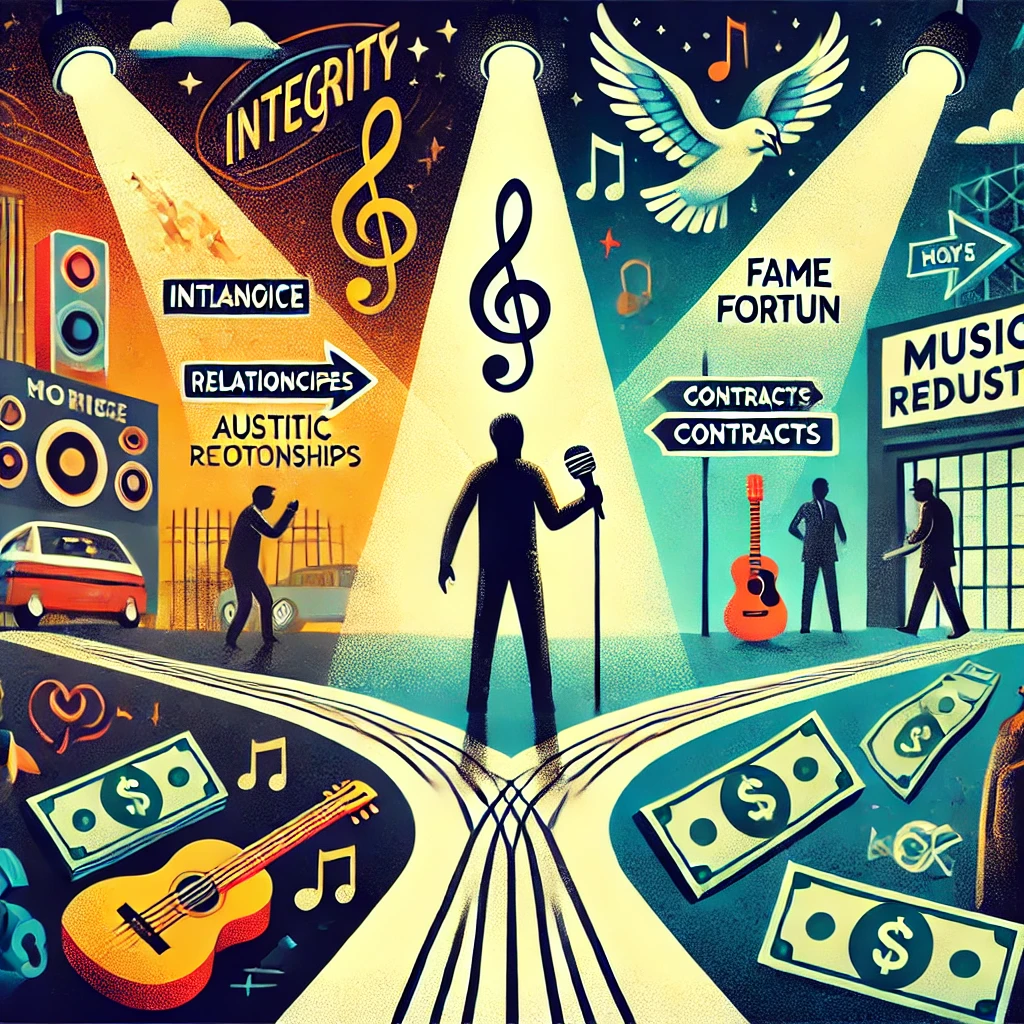The Moral Mistakes Aspiring Artists Make When Trying to Enter the Music Industry
Entering the music industry can be both exciting and overwhelming for aspiring artists. The prospect of fame, fortune, and recognition often drives talented individuals to pursue their dreams relentlessly. However, the path to success in the music industry is filled with challenges, and many aspiring artists make moral compromises. These moral mistakes can damage their character, relationships, and long-term careers. Let’s look at some of the most common moral pitfalls aspiring artists face as they strive to make a name for themselves.
1. Chasing Fame Over Artistic Integrity
One of the most prevalent moral mistakes is the pursuit of fame at the expense of artistic integrity. In a world driven by viral trends and instant gratification, many aspiring artists are tempted to conform to mainstream expectations or produce music solely for commercial gain. While wanting success is understandable, sacrificing authenticity can lead to a disconnect between the artist and their true creative vision. This not only diminishes their unique voice but also compromises the sincerity of their work. Staying true to one’s craft, even if it means a slower rise to success, is crucial for long-term fulfillment.
2. Compromising Values for Opportunities
The music industry can be highly competitive, and opportunities can be scarce, especially for newcomers. In an attempt to secure a deal, a performance, or a collaboration, some artists may be tempted to compromise their core values. Whether endorsing questionable brands, associating with individuals of dubious character, or engaging in unethical practices, the pressure to “make it” can cause artists to lower their moral standards. However, short-term gains from such compromises often come at the cost of an artist’s reputation and personal peace in the long run.
3. Engaging in Exploitative Relationships
Pursuing success can lead aspiring artists to enter exploitative relationships with managers, producers, or record labels. Unscrupulous individuals in the industry may take advantage of artists desperate for exposure, offering them bad deals or demanding unreasonable earnings percentages. Unfortunately, this often results in artists feeling trapped in unfavorable contracts that exploit their talent while leaving them with little control over their careers. Maintaining self-respect and thoroughly vetting business relationships is essential to avoiding exploitation.
4. Neglecting Personal Relationships for Career Advancement
As artists become more consumed with building their careers, they often neglect personal relationships. Friends, family, and loved ones may take a backseat to constant rehearsals, tours, and networking events. While dedication is essential, forsaking these vital connections can lead to feelings of isolation and regret. Prioritizing a healthy work-life balance, where relationships are nurtured alongside career aspirations, is key to long-term well-being.

5. Moral Ambiguity in Self-Promotion
In today’s digital age, self-promotion is crucial for success in the music industry. Social media platforms have made it easier for artists to reach large audiences, but they have also encouraged an unhealthy focus on appearances and follower counts. Some artists are tempted to present exaggerated or false versions of themselves to gain attention, promoting an image that doesn’t align with who they truly are. While self-marketing is important, it’s essential to maintain authenticity and avoid the moral trap of building a career on a facade.
6. Cutthroat Competition and Sabotaging Others
The competitive nature of the music industry often fosters an environment of rivalry. Some aspiring artists may adopt a cutthroat mentality, willing to sabotage others’ careers to get ahead. This could involve spreading rumors, undermining colleagues, or refusing to collaborate out of jealousy. Such behavior destroys potential partnerships and creates a toxic reputation that can haunt an artist’s career. Success built on harming others is rarely sustainable, and supporting peers is often a more effective path to personal growth and professional opportunities.
7. Turning to Destructive Coping Mechanisms
The stress and pressure of making it in the music industry can lead to burnout, anxiety, and frustration. In response, some aspiring artists turn to destructive coping mechanisms such as substance abuse, unhealthy relationships, or reckless behavior. These moral lapses can derail their progress and have long-term consequences on their mental and physical health. It’s important for artists to develop healthy outlets for stress, whether through mentorship, therapy, or spiritual practices, to stay grounded during difficult times.
8. Mismanaging Financial Success
When success finally comes, financial mismanagement is another common moral pitfall. Some artists, unprepared for sudden wealth, may indulge in materialism, overspend, or neglect charitable giving. While financial success rewards hard work, the temptation to use money irresponsibly can lead to a life of excess and moral emptiness. Artists who prioritize financial literacy, generosity, and long-term planning are better equipped to handle wealth with integrity.
Conclusion
The music industry offers endless opportunities for aspiring artists, but it also presents moral challenges that can test their values and principles. From compromising artistic integrity to engaging in destructive behaviors, the temptation to abandon one’s morals is real. However, by staying true to their values, nurturing meaningful relationships, and avoiding shortcuts, aspiring artists can build careers based on authenticity, integrity, and lasting success.
Ultimately, the key to a fulfilling career lies not only in talent but also in maintaining a strong moral compass, even when faced with adversity. A music career built on integrity will resonate more deeply with the artist and their audience, creating a legacy of genuine impact.
